- Home
- Nancy Pickard
Say No to Murder Page 6
Say No to Murder Read online
Page 6
Betty tended to rile easily.
“Now honey,” her husband murmured ineffectually.
“Here!” Goose stuck the hors d’oeuvres under Ted Sullivan’s nose. “You’re the great defender of free enterprise, Sullivan—you eat the filthy damn thing!”
Ted looked surprised, but he took the offering before Goose could impale him with it. He said mildly, “But Goose, all I ever said was that it’s their property, and they ought to be able to do what they . . .”
“All right, folks!” called Mary Eberhardt from across the room. In her trim beige suit, she looked every inch the minister’s wife. As such, I suspected she had long experience in deflecting trouble wherever it arose. And this meeting was already in trouble. I could feel sides forming, even before we’d named the game.
“Everyone is here but the mayor,” Mary called out. “But we can’t wait forever for her . . . you know how slow those Republicans are to move on anything new!”
A good-natured chuckle circled the room, breaking the ill-temper that was building. Or so I thought. We moved obediently to the table. I caught Ted Sullivan making an unobtrusive deposit in a wastebasket on his way; he winked at me when the hors d’oeuvre hit the bottom of the basket with a plunk. The nine of us who were present sat down, gravitating naturally toward the people with whom we usually voted: Mary and Hardy Eberhardt, Jack Fenton, Ted Sullivan and I filled one side; Goose Shattuck, Betty and Pete Tower, and Webster Helms occupied the other, with a chair reserved for the mayor. I put the Towers’ hors d’oeuvres tray in the center of the table. There were lookers, but no takers.
In the absence of our chairwoman, Barbara Schneider, Web Helms rose to start the meeting.
“I have asked you here today,” he said, and Hardy Eberhardt nudged me under the table so that I had to bite my lip to keep from smiling, “to address the fact that a party or parties unknown is trying to sabotage Liberty Harbor.”
“Oh, come on, Web,” Hardy objected. The minister’s square black hands were spread out in front of him on the table. “It was just some kids with a bow and arrow, that’s all.”
“That was no kid who killed Ansen Reich,” Goose said heatedly. “And what about my tires, Reverend? How do you explain how somebody just happened to disable me so I couldn’t make my usual late rounds?”
“There! You see?” Web Helms pounded a small fist on the polished walnut. “These are clearly acts of sabotage!”
Betty Tower gasped theatrically. “My God,” she exclaimed, “it’s a maniac!” Her husband clicked repeatedly like castinets.
In spite of their expressions of dismay, however, I sensed a curious lack of spontaneity from the contingent across the table. There was an air in that room of something having been rehearsed. What were they up to? I wondered.
“Hold on.” Hardy silenced the hubbub. “I don’t believe there’s evidence to link the murder with the arson, or with the vandalism of your property, Goose. Is there, Jenny?”
My connection to Geof made me the resident police authority wherever I went. “Not directly,” I said, “yet.”
“There.” Hardy was caustic. “I suggest we refrain from jumping to melodramatic conclusions like some newspapers I could name. Anyway, we have other important matters to discuss today.” I saw a look pass between the minister and his wife. But Web Helms interrupted before they could say whatever was on their minds.
“More important things?” Webster heard Hardy incorrectly, either by accident or by choice. “They destroyed my office at the site! They burned my most important blueprints, they . . .”
“Office?” I couldn’t help but interject. “Come on, Web, it was just a shack. And you have copies of everything you lost, don’t you? Well, don’t you?”
“Of course, Jenny, but . . .”
“So,” Hardy moved in quickly, “let’s not make any more of this than there is. Let’s talk about positive things, like . . .”
Betty Tower said sharply, “Well, it’s all very well for you to be sanguine about murder and arson, Reverend. I mean, you don’t have to preach out there at the harbor, do you? Pete and I have to work there with some murderer running loose!”
“Tsk,” her husband said.
Jack Fenton cleared his throat. It was all the distinguished banker ever needed to do to get the attention of any group. “Betty,” he said kindly, “the idea of sabotage presupposes the idea of someone with ill feelings against the renovation. And we know how supportive this community is of the project. I simply can’t think of anyone who would do such a thing.”
“But . . .” sputtered Betty and Webster.
“And it seems to me,” the banker continued implacably, “that as the advisory committee for the community, it behooves us to take a calm and conservative point of view.”
There was a moment of rebellious silence from across the table while Betty, Pete, Goose, and Web tried to figure out how to regain the conservative label that Jack had so neatly, and mischievously usurped from them.
Webster couldn’t handle it.
“I don’t care what you say!” he declared passionately, “That maniac was coming right at us! He was trying to kill us! And it’s all part of a plot against the harbor!”
Hardy, inadvisedly, grinned, “A Communist plot, Web?” he asked.
“Well,” said Ted Sullivan just before Web Helms exploded into a thousand red-haired pieces, “what do you want to do about it, Webster?”
The architect looked at the realtor gratefully.
“A citizens’ committee,” he blurted, “to patrol and protect the interests of the good citizens of Port Frederick.”
“A vigilante committee?” Mary Eberhardt said in dismay. “You can’t be serious, Webster. You don’t mean guns and all, do you?”
“Second the motion,” said Betty Tower.
“What motion?” I said.
“Discussion,” commanded Webster.
“I’m for it!” announced Goose, shaking our fillings. “I can let my guards go; God knows, as low as I bid to get this job, I can stand to cut some corners. I say yea!”
“All in favor,” Webster said, “say aye.”
“Aye,” echoed Betty, Pete, Goose and Ted.
“Discussion!” Hardy Eberhardt shouted. “Discussion!”
“All opposed, say nay.”
“No!” said Hardy, Mary, Jack and Jenny. “No!”
“As chairman,” Web said, “I break the tie by voting affirmatively. Motion carries five to four.” And he sank back into his chair and heaved a huge sigh.
“You can’t do that!” Jack Fenton drew himself up as if every banker’s inch of him was outraged. “You can’t.”
Betty Tower’s smile was nearly a smirk, “We’ve already done it, Jack. Web here is the head of the Citizens’ Watch Committee, and I’m second-in-command, and we’ve got our patrols all lined up for the month. It’s a favor to Goose, really, because it allows him to let his guards go, so hell save all sorts of money that could be better spent at the project, And we citizens will take a more personal interest in keeping the project safe from harm; we’re bound to be more effective than paid mercenaries.”
“Mercenaries?” I said.
“We didn’t have to take a vote at all,” she said magnanimously. “We only brought it up in committee today to be gracious; didn’t want you folks to feel left out of something that is bound to be important to the project.”
“Gracious?” I said.
“Left out?” Hardy said, and then he began to laugh. “The Port Frederick Goddamned Posse!” He pulled a white handkerchief from his suit pocket and wiped his eyes. “Oh, my.”
“Now Hardy,” his wife murmured. Mary Eberhardt looked shocked, but whether at her husband’s language or the foolishness of the motion on the floor, I didn’t know. But she held the floor while she had it. “While we’re taking votes on one thing and another,” she said, so nonchalantly that I turned to stare at her, “there’s something that Hardy and I would like the committee to cons
ider.”
“Yeah, Web,” Hardy sighed, and gave his eyes a last swipe. “After this vigilante business, you owe us one, babe.”
“Let’s wait for Barbara,” Ted Sullivan suggested.
“No,” Mary said so quickly I knew something was up. What did they want to vote on that they didn’t want Barbara to hear? More tactfully, Mary added, “Let’s not wait. We don’t want to take up any more of your valuable time than we have to, do we, dear?”
The merriment had gone from her husband’s intense brown eyes. In their depths, I thought I glimpsed something angry. And sly.
So we didn’t wait for the mayor.
And that’s how the Eberhardts managed to get through committee the proposal that would come back tragically to haunt them.
“We propose,” said Mary, softly but firmly, “a memorial to the African-Americans who lost their lives in the slave trade which flourished at Liberty Harbor. We, that is the black community of Port Frederick, are thinking of a memorial that we would call the Unmarked Grave . . .”
chapter
10
“The Unmarked Grave?”
Barbara Schneider, our mayor and chairwoman, stood at the far end of the conference table looking at all of us as if we had lost our minds. She’d arrived in time to hear the news, but too late to cast the deciding vote against the proposal.
“At a shopping mall?” she exclaimed. It is difficult to look seriously outraged in a Lilly Pulitzer dress, but Barbara was succeeding. “I never heard of anything so macabre in all my life!”
Everyone else seemed to have been struck dumb by the vehemence of her opposition, so I spoke up. “As you know perfectly well, Barbara, Liberty Harbor is not just a mall. There’s the cultural center, and the ship-building school, and . . .”
“And now, friends and neighbors, a gravestone!”
“No, not a gravestone,” I corrected her. “That’s the point, Barbara. The idea that Hardy and Mary proposed and that we approved is to dig a single grave and leave it unmarked, just as all those thousands of slaves were buried in unmarked graves throughout the country.”
“Well, if it’s not marked,” she said with icy sarcasm, “how is anybody going to know it’s there?”
Hardy Eberhardt answered her, not bothering to hide the amusement and triumph in his voice, “There will be a low fence around the grave, and a plain white cross on the grave.”
“A cross,” she said bitterly. ’Oh that’s wonderful. Tourists will think it’s a memorial to a traffic accident.”
“No.” Mary Eberhardt sighed. “No, Barbara, there will be a few simple words on a small plaque that will be attached to the small fence. It will be unobtrusive, I assure you, and we think it will be a lovely tribute.”
“But at a shopping center!” The mayor shook her handsome head in dismay; the movement disturbed not a hair of her perfect coiffure. “It’s in dreadful taste!”
“So was slavery,” I said.
“You’ve gone too far this time, Reverend,” she intoned. “My Lord, we gave you the employment quota, we gave you space in the mall for your people to set up shops, we even gave you the name of the place! And now you trivialize it over something that is merely symbolic instead of real. And just when it was all going so well for you people.”
“Us,” I said.
“Us?” She turned toward me again as toward an annoying, biting insect.
“That’s the problem,” I said. “Thinking of them as them and us as us.”
“Spare me the polemics, Jennifer,” she said coldly. She turned back to stare at Hardy. “What will you want next, Reverend, a memorial restroom marked Coloreds Only?”
Even Betty Tower drew in her breath at that one. But Hardy only laughed that full-bellied laugh of his and said, “Sorry, your Honor, but we got the votes’ on this one. That’ll teach you to get to meetings late.”
“I would have been here on time,” she said furiously, glaring at Webster Helms at the other end of the table, “if someone had given me the correct time for the meeting.” But she wasn’t to be sidetracked from the Unmarked Grave. “I am mayor today because I campaigned last time on a platform of economic recovery, Reverend, and I will not allow you or anybody else to turn our recovery into a sideshow for pet causes and special-interest groups.”
Hardy continued to smile pleasantly. He’d been weaned on the civil rights movement of the sixties, and was not likely to be easily intimidated by a small-town mayor who didn’t like his liberal ideas. So far, Hardy had bested Barbara in every battle over fair employment and equal opportunities. Sometimes I worried that in so doing, he might be losing a bigger war he didn’t know he was fighting. On a personal level, Barbara was a nice enough lady, but on a political level, she was a fierce opponent who held grudges that made East and West Germany look like pals. If he had asked my advice, which he hadn’t, I might have told him to let her win one now and then, just enough small points to keep her ambition at bay.
“And I’ll tell you something, Reverend.” Her intelligent eyes narrowed, as if in sudden inspiration. “The people will agree with me. They won’t let anything stand in the way of the benefits they’ll gain from this renovation. If you don’t believe me, well ask them!”
“You want to take it to the people?” Hardy leaned forward, and his smile turned, wicked. There was an electricity in the air that fairly made my skin crackle. “I’ll go you one better, your Honor. How about taking it to my people, as you would put it? This Sunday, my church, my pulpit. Winner takes all.”
Her mouth fell open slightly, showing small, perfect teeth. Then she leaned forward avidly to meet him. “Let me get this straight. You convince the congregation that the grave is a brilliant idea, and you get it, right? But if I convince them that it’s counterproductive, there will be no grave, no cross, no more of this memorial nonsense. Right?”
He looked around the table at each of us. “Any objections from the committee?” he asked. Nobody spoke. “All right,” he said, turning back to the mayor. “All right.”
“You’re on, Reverend,” said the mayor of Port Frederick, Massachusetts. She wheeled on her heels and clicked off toward the door. But then she paused to wither the temporary chairman with a look. “As for your Citizens’ Watch Committee, Webster, that’s the second worst idea I ever heard. For God’s sake, try not to shoot yourself in the foot.”
Our mayor swept out, leaving her fellow conservatives openmouthed with embarrassment. Webster Helms took the yellow pencil on the table in front of him and snapped it neatly in two.
We adjourned shortly thereafter. I walked out of the meeting beside our friendly neighborhood banker, Jack Fenton. “I get the feeling,” I said quietly to him, “that we have just been railroaded by two trains coming from different directions.”
“This committee has always been home to divergent views,” he mused, “but heretofore, we have been able to conduct our debates in a more or less harmonious fashion. And certainly within the privacy of the conference chamber, rather than resorting to public brawls such as the reverend and the mayor have proposed! From where do you suppose this tension stems, this business of friend voting against friend, of open warfare? Do you suppose the troubles at the harbor have put us on edge?”
“Murder will do that,” I said dryly. “But never mind about this committee, Jack . . . what have you done with my father?”
“I sent him to lunch with a vice-president of the trust department.”
“You have something against this particular VP?”
He smiled. “That is what vice-presidents are for, Jennifer, to assume the more onerous duties the chairman wishes to avoid. My goodness, but your father is certainly put out that we didn’t name the harbor after him!”
“You didn’t tell him about this meeting?”
He shot me a horrified look. “I didn’t get to this age by being stupid,” he pointed out.
“Silly of me even to suggest it. But what did you say to his offer to help us with the projec
t?”
The old banker drew himself up to his full and considerable height. “I told your father,” he said with dignity, “that he could be of estimable service to the community of his birth by taking Ted Sullivan’s boat and anchoring it out in the bay where he could watch over the construction of Liberty Harbor day and night.”
“You didn’t.”
“I did. And I further told him that we would receive his regular reports with all the interest they so richly deserve.”
“That,” I said, stunned into admiration, “is brilliant.”
He squeezed my shoulder paternally, then said in a gentler tone, “Hell be all right, Jennifer, if he can get over this obsession with the harbor. Your father always lands on his feet.”
“I don’t know that I’d call it an obsession, Jack.”
“It would take no less than that to draw your father away from his golf game,” he retorted dryly. “I think he views this as an opportunity to vindicate himself with this town.” He eyed me. “And his daughters.”
“Sherry and me?” I laughed ruefully. “I’m sorry to sound disrespectful, Jack, but my father believes that his very existence is vindication enough for anything.”
He didn’t argue. When we reached the front door of the building, he said, “I’ll see you this Sunday, my dear.” And he winked. “At the First Church of the Risen Christ. Oh my, I wouldn’t miss this spectacle for anything—even if the Fed offered to lower the prime rate.”
Betty and Pete Tower followed us out the door, then passed us. She held her hors d’oeuvres tray far out in front of her chest, and her pert nose in the air. She wasn’t being haughty. After our three-hour meeting, the lobster-pineapple treats smelled like a hot day at an old pier.

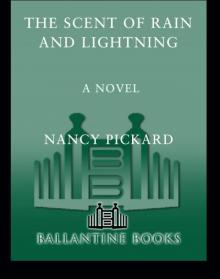 The Scent of Rain and Lightning
The Scent of Rain and Lightning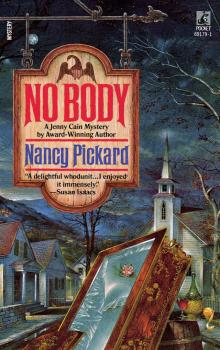 No Body
No Body The Secret Ingredient Murders: A Eugenia Potter Mystery
The Secret Ingredient Murders: A Eugenia Potter Mystery The 27-Ingredient Chili Con Carne Murders: A Eugenia Potter Mystery
The 27-Ingredient Chili Con Carne Murders: A Eugenia Potter Mystery Twilight
Twilight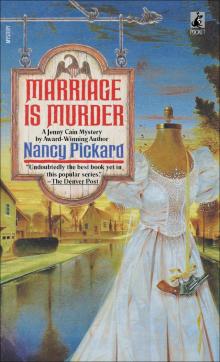 Marriage Is Murder
Marriage Is Murder I.O.U
I.O.U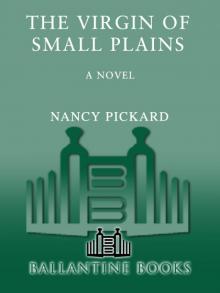 The Virgin of Small Plains
The Virgin of Small Plains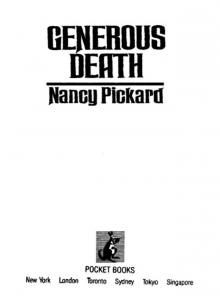 Generous Death
Generous Death The Whole Truth
The Whole Truth The Blue Corn Murders
The Blue Corn Murders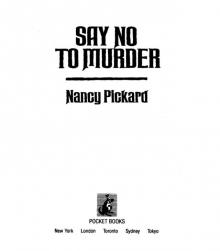 Say No to Murder
Say No to Murder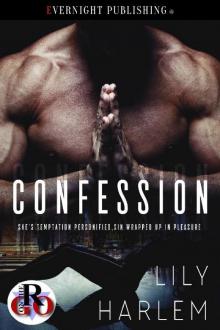 Confession
Confession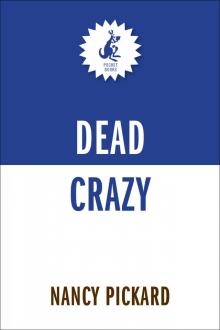 Dead Crazy
Dead Crazy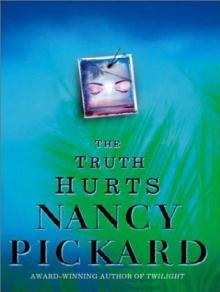 The Truth Hurts
The Truth Hurts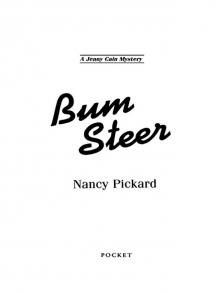 Bum Steer
Bum Steer